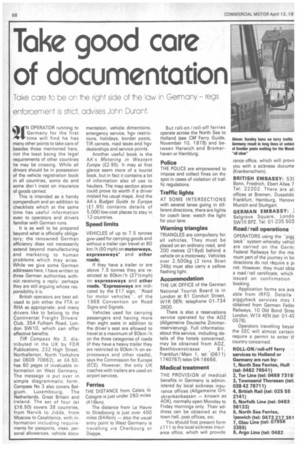Take good care of documentation
Page 70

If you've noticed an error in this article please click here to report it so we can fix it.
Take care to be on the right side of le law in Germany regs enforcement is strict, advises John Durant.
9j. ' N OPERATOR running to Germany for the first time will find he has many other points to take care of besides those mentioned here, not the least being the legal requirements of other countries he may be crossing. While all drivers should be in possession of the vehicle registration book in all countries, some do and some don't insist on insurance
of goods carried. .
This is intended as a handy compendium and an addition to checklists which at the same time has useful information even to operators and drivers familiar with German runs.
It is as well to be prepared beyond what is officially obligatory; the renowned German efficiency does not necessarily extend beyond manufacturing and marketing to human problems which may arise. While we give some German addresses here, I have written to three German authorities without receiving a reply: perhaps they are still arguing whose responsibility it is.
British operators are best advised to join either the FTA or RHA as appropriate: and many drivers like to belong to the Continental Freight Drivers' Club, 354 Fulham Road, London SW10, which can offer effective benefits.
TIR Compass No 3, distributed in the UK by FOR Publications, 232 High Street, Northallerton, North Yorkshire (tel 0609 70862), at £4.50, has 60 pages of invaluable information on West Germany. The message is put over in simple diagrammatic form. Compass No 3 also covers Belgium, Luxembourg, The Netherlands, Great Britain and Ireland. The set of four (at £16.50) covers 38 countries, from Narvik to Jidda, from Moscow to Casablanca, with information including requirements for passports, visas, personal allowances, vehicle docu
mentation, vehicle dimentions, emergency service, hgv restrictions, 'holidays, border posts, TIR carnets, road taxes and hgv dealerships and service points.
Another useful book is the AA's Motoring in Western Europe (£2.95). It may at first glance seem more of a tourist book, but in fact it contains a lot of information also of use to hauliers. The map section alone could prove its worth if a driver mislaid his usual maps. And the AA's Budget Guide to Europe (£1 .95) contains details of 5,000 low-cost places to stay in 12 countries.
Speed limits
VEHICLES of up to 7.5 tonnes gvw used for carrying goods and without a trailer can travel at 80 km/h (50 mph) on motorways, expressways* and other roads; If they have a trailer or are above 7.5 tonnes they are restricted to 60km /h (371/2mph) on expressways and other roads. *Expressways are indicated by the E1 7. sign, "Road for motor vehicles'', of the 1968 Convention on Road Signs and Signals.
Vehicles used for carrying passengers and having more than eight seats in addition to the driver's seat are allowed to travel at a maximum of 80km / h on the three categories of roads (if they have a heavy trailer they are restricted to 60km /h on expressways and other roads), says the Commission for Europe (ECE). However, the only UK coaches with trailers are used on airport services.
Ferries
THE DISTANCE from Calais to Cologne is just under 260 miles (418km).
The distance from Le Havre to Strasbourg is just over 400 miles (644km) — also the usual entry point to West Germany is travelling via Cherbourg or Dieppe. But roll-on /roll-off ferries operate across the North Sea to Holland (see CM Ferry Guide, November 10, 1978) and between Harwich and Bremerhaven or Hamburg.
Police
THE POLICE are empowered to impose and collect fines on the spot in cases of violation of traffic regulations.
Traffic lights
AT SOME INTERSECTIONS with several lanes going in different directions, there are lights for coach lane: watch the light for your lane.
Warning triangles
TRIANGLES are compulsory for all vehicles. They must be placed on an ordinary road, and 200 metres (219yd) behind a vehicle on a motorway. Vehicles over 2,500kg (2 tons 9cwt 241b) must also carry a yellow flashing light.
Accommodation
THE UK OFFICE of the German National Tourist Board is in London at 61 Conduit Street, W1R OEN; telephone 01-734 2600.
There is also a reservations service operated by the ADZ (Allgememe Deutsche Zimmerreservierung). Full informatior, about this service, including details of the hotels concerned, may be obtained from ADZ, Beethbvenstrasse 61, Frankfurt! Main 1, tell (0611) 1740767) telex 04-16666.
Medical. treatment
THE PROVISION of medical benefits in Germany is administered by local sickness insurance offices (Allgemeine Ort skrankenkassen known as AOK), normally open Monday to Friday mornings only. Their address can be obtained at the town hall, post offices, etc.
You should first present form El 1 1 to the local sickness insurance office, which will provide rance office, which will provii you with a sickness docuMe (Krankenschein).
BRITISH EMBASSY: 53( Bonn, Friedrich, Ebert Allee 7 Tel: 22202. There are al! offices at Bremen, Dusseldo Frankfurt, 'Hamburg, Hanovf Munich and Stuttgart.
GERMAN EMBASSY: Belgrave Square, Londo SW1X 8PZ. Tel: 01-235 503
Road/rail operations
OPERATORS using the "pia back" system whereby vehicl are carried on the Germ; Federal Railways for the ma mum part of the journey in be directions do not require a pi mit. However, they must obta a road/rail certificate, which issued on confirmation booking.
Application forms are ava able from IRFO. Details. piggyback services may I obtained from German Feder Railways, 10 Old Bond Str'eE London, W1X 4EN (tel: 01-4 0578).
Operators travelling beyor the EEC will almost certain require a permit to enter tf country concerned.
















































































































